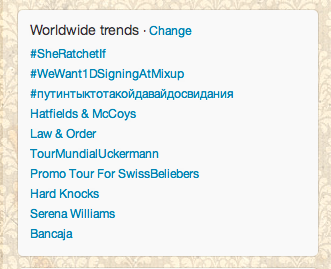For a short period of time last month, a Russian hashtag ranked among the top worldwide trends on Twitter. What makes this hashtag remarkable — aside from the fact that it is written in Cyrillic — is that it consists of 30 letters! “#путинтыктотакойдавайдосвидания [1]” (#putintyktotakoidavaidosvidaniia) can be translated roughly as “Putin, who are you? C'mon, goodbye.”

Screenshot of the anti-Putin hashtag trending 3rd place worldwide. 29 May 2012.
The phrase has a curious sound in Russian, as well. Indeed, it originated among a group of Russian-speaking Azerbaijanis. Earlier this year, guests at a wedding in Azerbaijan decided to perform the traditional Meyhana musical competition [2] (a kind of rap-battle). Because not everyone could speak fluent Azeri (some belonged to Talysh ethnic minority [3] [en]), they chose to compete in (broken) Russian, instead, finishing each verse with the words, “Ты кто такой? Давай, до свидания!” (“Who are you? C'mon, goodbye!”)
The video of this ‘rap-battle’ went viral among Russian viewers online, giving birth to the meme, “Ty kto takoi? Davai, do svidaniia.” Very soon, the phrase became a common ‘weapon’ on Russian forums and blogs, used to disrespect and offend virtual opponents. It was Aleksei Filin, Coordinator of the Motorists Federation's Moscow Department, who first prominently politicized the meme, tweeting [4] [ru]:
Завтра повешу на машину табличку: “Путин ты кто такой? Давай, до свидания”. Буду дарить людям улыбки!
The phrase was retweeted by the members of the infamous Russian art group, “Voina,” [5] who helped popularize it on Twitter, leading to the hashtag, “#путинтыктотакойдавайдосвидания.”
Today, the hashtag is often used in discussions about Russian politics and the protest movement. For instance, here is one tweet [6] from Iosif Levinson (@Osya_Levinson) that uses the meme to address how federal investigators recently (and controversially) searched the homes and businesses of several famous oppositionists:
путин потерял совесть и ищет теперь ее в квартирах оппозиционеров! #путинтыктотакойдавайдосвидания [7]
Independent of headlining news, the hashtag has also become a popular means of expressing general antipathy toward President Putin. For example, user @slonomuh writes:
прощай путин… а кто с ним вообще здоровался?! #Путинтыктотакойдавайдосвидания [8]
Putin, however, does not enjoy a monopoly on being “goodbye'd” by Russian netizens. A new iteration of the trend has emerged in the wake of Russia's elimination by Greece in the 2012 UEFA European Football [Soccer] Championship [9] [en]. Before their defeat, many fans began wishing the Russian team victory on Twitter by using the hashtag #грециядавайдосвидания (“Greece, c'mon, goodbye”). Unfortunately, these hopes were dashed when Greece won the match by a score of zero-to-one. Twitter user Dima Aurum (@DimaAurum) mourned [10] the result, perhaps intentionally echoing a phrase [11] [ru] popularized by Viktor Chernomyrdin (“We wanted something better, but it turned out as always”):
Должна была быть #Грециядавайдосвидания [12], а получилась #Россиядавайдосвидания [13] и это печаль….